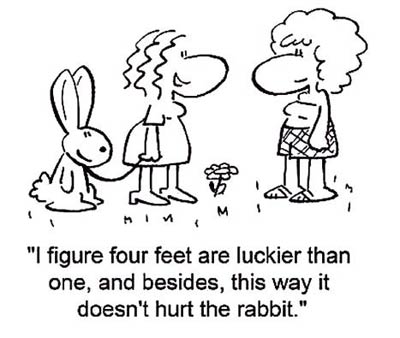對于鄰居家后院小工作棚的命運,我有一份特別的關(guān)心。原因無他,就是為了那一群眼睛紅紅、耳朵尖尖的小家伙。

By Ferida Wolff
王丁玎 選注
I was doing a crossword puzzle, enjoying my morning cup of jasmine tea, and planning my day in a lazy, peaceful sort of way when I heard the first whack of the hammer.[2] It was quickly followed by the screech of nails being pried out of wood.[3]
I suspected and dreaded the cause; my neighbor had been talking for years about taking down his backyard shed[4]. Not that it wasn’t warranted[5]. The boards were warped and weathered, the door misaligned, and the floor was losing its ability to hold up the increasingly unstable structure.[6] The shed had been put up two decades ago to house my neighbor’s lawn-and-garden equipment. But he has since hired a lawn service and doesn’t need that stuff anymore.
Sure enough, when I looked out the kitchen window, there was a workman yanking boards off one by one, revealing the forlorn skeleton of the shed.[7]
“Oh, no,” I said aloud, as if my neighbor could hear me. “Don’t do it.”
My concern wasn’t for the shed but for the inhabitants of its “cellar[8].” My neighbor’s backyard slopes, so when the shed was constructed, in order for the floor to be level, it had to be raised slightly in the back.[9] And under that elevated section lived an assortment of creatures—chipmunks, an occasional groundhog, but most notably the bunnies.[10]
Every spring the adult rabbits emerge from their burrow with new babies in tow.[11] The bunnies trot over to my yard to sample the succulent clover or nibble on the sprouts that shoot up from sunflower seeds dropped by the birds on my bird feeders and forgotten.[12] I see the bunnies eat marigold[13] buds, not knowing that they are supposed to dislike them.
I realize that rabbits can be classified as pests[14]; I rarely get to see any of the hundreds of tulips I have planted over the years because, while they are beautiful to people, they are delicious to the rabbits. But I can put up with that. I get so much joy from sharing my space with these fuzzy[15] beings.
They always surprise me. Like the time I put down a bowl of dry cereal I was eating on outdoors to water my garden and when I returned, a bunny was helping itself right from my dish. Or the late afternoon when I was on my knees weeding and a rabbit came nearby to graze[16]. We were no more than three feet apart, grazing in companionable, and on my part awed, silence.[17]
I am worried about their welfare, though. I live in a suburb of New Jersey, which has grown into one of the largest towns in the state. We now have 70,000 residents, lots of stores, and even more traffic. The township bought the last working farm to preserve evidence of the rural heritage of the area. I was hoping that one tiny space, underneath my neighbor’s shed, would serve as a haven for a little of the remaining local wildlife.
“Stop worrying,” my husband said. “Wild beings know how to survive. Especially rabbits.”
Perhaps. But all the surrounding towns are now being seriously developed. I see hawks up in the branches of the neighborhood trees. A housing development is not a natural habitat for such raptors.[18] One day my husband saw a turkey buzzard perched on our chimney; they are becoming a frequent, and rather disconcerting, sight on streets and in backyards.[19]
The day the shed was totally dismantled, the gray boards hauled off to wherever sheds go,[20] I saw my neighbor outside. I went out to ask if he planned to put up another shed. But the words wouldn’t come out.
“The bunnies!” was all I said as we stood there together looking at the now very open spot in his yard. He laughed.
“They took off like a shot,” he said. “It took them all of four seconds to scoot[21] under that shed.”
He pointed to the neighbor’s yard diagonally[22] across from mine. There was a shed I hadn’t noticed because it was blocked by the shed that was just taken down. A bigger shed. One that wasn’t about to come to pieces around them. The rabbits may have been forced from their original home but they had moved to a much better location.
And their new digs weren’t so very far away. Maybe the rabbits will find their way back into my yard next spring. Maybe they will remember my fine clover and the seeds that fall from the feeders.
The first things I intend to plant next year in my garden are marigolds. I think the bunnies like the red ones best.
Vocabulary
1. haven: 安全的地方,庇護所。
2. crossword puzzle: 縱橫字謎;jasmine tea: 茉莉花茶;whack: 重擊。
3. screech: 尖銳刺耳的聲音;pry: 撬開,撬起。
4. shed: 工作棚,貨棚。
5. warrant: 證明……有正當(dāng)理由。
6. 木板已扭曲風(fēng)化,門也錯位了,地板難以再支撐越來越不牢固的結(jié)構(gòu)。misalign: 使不正,使失調(diào)。
7. yank: 猛拉;forlorn: 荒涼的;skeleton: (建筑物的)骨架。
8. cellar: 地下室,地窖。
9. slope: 傾斜;level: 水平的。
10. 在墊高的那塊地的下面,生活著許多動物:花栗鼠,偶爾有土撥鼠,但最多的是小兔子。
11. burrow: 洞穴;in tow: 拖著,在一起。
12. trot: 疾走;succulent: 多汁的;nibble: 細咬;sprout: 嫩芽;feeder: 給食器。
13. marigold: 金盞花。
14. pest: 有害動(植)物。
15. fuzzy: 有絨毛的。
16. graze: 吃草。
17. companionable: 表示友好的;awed: 充滿敬畏的。
18. development: 新建住宅區(qū);habitat: 棲息地,居留地;raptor: 猛禽,肉食鳥。
19. turkey buzzard: 土耳其禿鷹;perch: 棲息;disconcerting: 令人不安的。
20. dismantle: 拆除;haul: 拖,拉。
21. scoot: 疾走,快跑。
22. diagonally: 對角地。
(來源:英語學(xué)習(xí)雜志)
